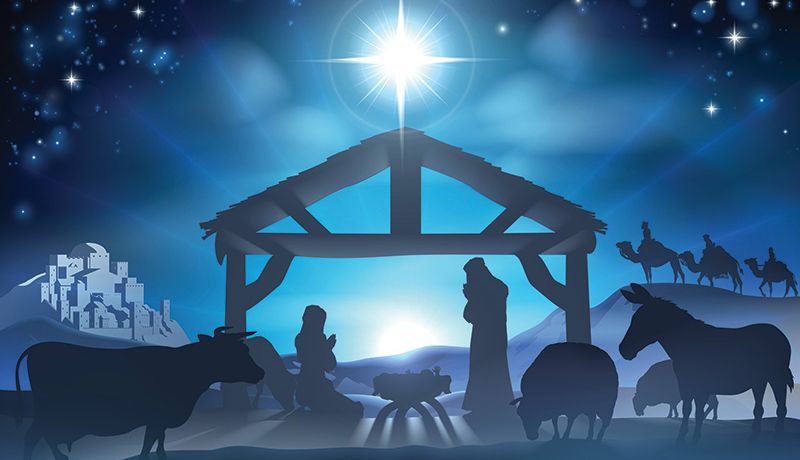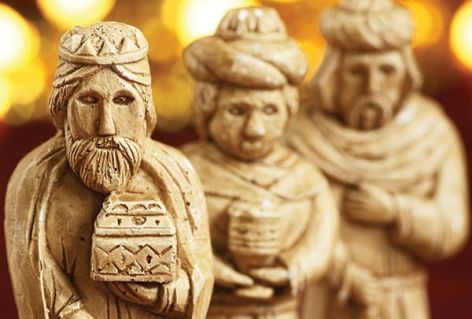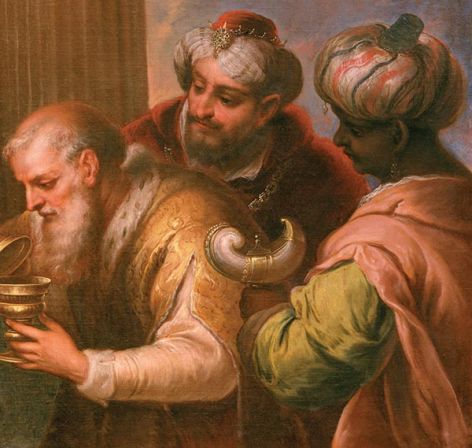.
The Birth of Jesus: Myths and Misperceptions
 “Jesus Christ’s birth is often depicted in artwork, movies, storybooks and nativity scenes. But do these traditional images get the story right?
“Jesus Christ’s birth is often depicted in artwork, movies, storybooks and nativity scenes. But do these traditional images get the story right?
The typical nativity scene depicts a manger surrounded by Mary and Joseph and animals, with three wise men arriving just after Jesus' birth. But what's wrong with this picture?
Every year during the Christmas season, churches, homes and even businesses display nativity scenes portraying the common image most people have in mind about the birth of Jesus Christ.
A Christ-child representation usually occupies center stage, lying in a manger with outstretched arms as His loving mother Mary (with Joseph standing somewhere beside or behind her) kneels, gazing adoringly down at Him. Surrounding the family will be the three wise men, wearing ornate kingly garments and bowing worshipfully. And, of course, a nativity scene wouldn’t be complete without some shepherds, sheep, cows and donkeys in close proximity.
If you have read this column in the past, you know that we often challenge traditional Christianity for inaccurately portraying Jesus and His teachings. We don’t do this just to be picky, but because we believe that when it comes to Jesus and the Bible, truth matters.
After all, the Bible claims that Jesus was the Son of God, literally God in the flesh. Doesn’t it make sense that any teaching about Him must be presented with care and fidelity to the biblical text? Sadly, many of the images in our minds of Jesus’ birth contain myths with no grounding in the biblical record.
Although Christianity celebrates His birth as one of its two most holy and sacred holidays, it’s striking that only two of the Gospel writers chose to even write about the event. Luke gives it the most attention, while Matthew covers it only very briefly. Mark and John don’t reference it at all—devoting their Gospels instead almost entirely to Jesus’ adult life, ministry and death. The later New Testament writers, such as Paul, Peter, James and Jude, don’t mention Jesus’ birthday at all!
Does that mean Jesus’ birth was insignificant? Not at all! But the fact is the Gospel writers put very little emphasis on it, meaning we have few details of the actual event. Let’s explore a couple of common myths and misperceptions regarding the birth of Jesus, and then ask the most important question.
Jesus was born on Dec. 25
Millions of people around the world celebrate Jesus’ birth on Dec. 25 (those in the Orthodox tradition celebrate it about two weeks later on Jan. 7, which is Dec. 25 on the old Julian calendar). But is there any reason to believe that Jesus was born in the middle of winter? Matthew’s and Luke’s accounts give no direct mention of the date or season. When the Bible is noticeably silent on such a detail, it is wise to consider that perhaps there’s a reason for that silence. Is it possible that God left that detail ambiguous because He didn’t intend Jesus’ birth to be celebrated as a holiday?
The Bible’s silence on any specific season or date of His birth is notable, but also significant are the clues in the Gospel accounts that point to Jesus’ birth not occurring in the winter.
First, consider the reason Joseph and Mary traveled to Jerusalem. Luke records: “And it came to pass in those days that a decree went out from Caesar Augustus that all the world should be registered. … Joseph also went up from Galilee, out of the city of Nazareth, into Judea, to the city of David, which is called Bethlehem … to be registered with Mary, his betrothed wife, who was with child” (Luke 2:1, 4-5).
It is doubtful that Roman authorities would have required people to travel and register for a census in the typically rainy and cold winter months of the year (Song of Solomon 2:11; Ezra 10:9, 13). More likely, they would have conducted the census during a season when it would be easier to travel.
Luke provides another key detail indicating this didn’t take place in the winter months: “Now there were in the same country shepherds living out in the fields, keeping watch over their flock by night” (Luke 2:8).
The decision to celebrate Dec. 25 as the day of Jesus’ birth was not based on any biblical clues or hints.
Many Bible commentators point out that shepherds typically sheltered their sheep at night during the cold, rainy months—roughly November to March. Scholar A.T. Robertson wrote in the notes of his popular A Harmony of the Gospels, “The chief thing that appears proved is that December 25 is not the time [of Jesus’ birth], since the shepherds would hardly be in the fields at night with the flocks, which were usually taken into the folds in November and kept in till March. The nights of December would scarcely allow watching in the mountain fields even as far south as Bethlehem. And besides, the long journey from Nazareth to Bethlehem would hardly be made by Joseph and Mary in winter, the rainy season” (p. 267).
The decision to celebrate Dec. 25 as the day of Jesus’ birth was not based on any biblical clues or hints. Historical evidence points instead to it being chosen hundreds of years after Jesus’ birth in order to align with the winter solstice. Many ancient sun-worshipping religions celebrated the birthday of their various sun gods on the winter solstice in the northern hemisphere (the shortest day of the year) because from that day the sun began growing in strength again.
You can read more about the problems with this reasoning in our article “Christmas on Trial.”
Three wise men visited the newborn Jesus
 Three wise men are represented in different art forms. From top to bottom: Gypsum figurines, artist unknown; The Adoration of Magi by Pedro Atanasio Bocanegra.
Three wise men are represented in different art forms. From top to bottom: Gypsum figurines, artist unknown; The Adoration of Magi by Pedro Atanasio Bocanegra.
Nearly every nativity scene pictures three kings, or wise men, visiting the family on the night of Jesus’ birth. But a close reading of Matthew’s account (the only place these individuals are mentioned) shows several things are wrong with this modern notion.
First, Matthew places their coming after Jesus’ birth: “Now after Jesus was born in Bethlehem of Judea in the days of Herod the king, behold wise men from the East came to Jerusalem” (Matthew 2:1, emphasis added).
Notice how details from the rest of the account indicate this event took place weeks, months or perhaps as much as two years after the night of Jesus’ birth:
The wise men, when they arrived in Jerusalem, talked about Jesus’ birth as already having occurred (Matthew 2:2).
Three times in the account, Matthew describes Jesus as “the young child.” The Greek word used is paidion, which usually describes a child past nursing age. He could have used nepios, which more specifically describes a newborn baby (translated “nursing infants” in Matthew 21:16).
Matthew describes the wise men visiting Mary and the “young child” at “the house.” This could indicate that the family was living in a home in Bethlehem at this time.
Worst of all, the evil King Herod “put to death all the male children who were in Bethlehem and in all its districts, from two years old and under, according to the time which he had determined from the wise men” (Matthew 2:16).
Second, notice that the text says nothing about the specific number of wise men visiting Christ. It merely says “wise men [magos] from the East came to Jerusalem.” Some suppose there were three because they brought three gifts: “gold, frankincense, and myrrh” (Matthew 2:11). These were gifts often presented to a king, but they don’t indicate the number of wise men. It isn’t even very clear exactly who these men were or where they came from. They weren’t kings—as some call them—but seem to be wise men who had some knowledge of the Hebrew Scriptures and Judaism. The common myths and misperceptions about Jesus’ birth are all integral parts of the imagery of Christmas. Sadly, a holiday that claims to celebrate the Messiah’s birth has been the primary perpetuator of myths that confuse people about His birth.
The common myths and misperceptions about Jesus’ birth are all integral parts of the imagery of Christmas. Sadly, a holiday that claims to celebrate the Messiah’s birth has been the primary perpetuator of myths that confuse people about His birth.
Cut through the fallacies
And what’s the point, you might ask? These examples illustrate a common problem when it comes to the Bible. Whether these Christmas assumptions are big issues (substituting a sun god’s birthday for Jesus’) or small (there may not have been three wise men), they illustrate how people carelessly assume the Bible says things that, in reality, it doesn’t.
The common myths and misperceptions about Jesus’ birth are all integral parts of the imagery of Christmas. Sadly, a holiday that claims to celebrate the Messiah’s birth has been the primary perpetuator of myths that confuse people about His birth. But this is just one side of the problem with Christmas. The other side is that many elements of this holiday, including its date, symbols and traditions, are rooted in ancient pagan celebrations.
The best way to learn the truth about Jesus’ birth—and more importantly, His life—is to  abandon this holiday of myths and replace it with study and faithfulness to what is recorded in the Bible.”
abandon this holiday of myths and replace it with study and faithfulness to what is recorded in the Bible.”
From: https://lifehopeandtruth.com/god/who-is-jesus/the-birth-of-jesus/myths-and-misperceptions/
Does it matter which holidays we celebrate? Find the answers in our free booklet. Download now.
_______
Fulfilled Prophecy: Jesus Born in Bethlehem
Matthew 2:4-6
“And when he had gathered all the chief priests and scribes of the people together, he inquired of them where the Christ was to be born. So they said to him, “In Bethlehem of Judea, for thus it is written by the prophet: ‘But you, Bethlehem, in the land of Judah, are not the least among the rulers of Judah; for out of you shall come a Ruler who will shepherd My people Israel.’”
“The New Testament records dozens of Old Testament passages that were fulfilled in Jesus Christ. (The Zondervan NIV Bible Commentary, Volume 1, lists more than 100 such Old Testament passages on pages 1037-1040.) Matthew includes four quotes about Christ’s birth and young life, including this one.
Jealous and paranoid, King Herod was greatly disturbed when the wise men asked, “Where is He who has been born King of the Jews? For we have seen His star in the East and have come to worship Him” (Matthew 2:2). Herod realized that they were talking about the coming of the Messiah (Christ in Greek), and he asked the religious leaders what the Bible prophesied about the coming of the Messiah. They accurately pinpointed the prophecy about Bethlehem in Micah 5:2. (The Coming Messiah: 2 “But you, Bethlehem Ephrathah, Though you are little among the thousands of Judah, Yet out of you shall come forth to Me The One to be Ruler in Israel, Whose goings forth are from of old, From [a]everlasting.”)
Though Herod was willing to turn to Scripture to try to find the One he felt threatened by, he was not willing to recognize God’s power and authority. In fact he tried to thwart God’s plan, first through deceit, then through a terrible act of mass murder, killing all the male children from age 2 and under in the area of Bethlehem (Matthew 2:16). This was prophesied in Jeremiah 31:15 and depicted in Revelation 12:4 where Satan, the dragon, was ready “to devour her Child as soon as it was born.” But Christ was protected from this onslaught, as we will see.”
You can find more background about these events in the article “The Birth of Jesus.” From: https://lifehopeandtruth.com/bible/blog/fulfilled-prophecy-jesus-born-in-bethlehem/?
“The Gospel of Matthew quoted Jeremiah when recording the slaughter of the innocent babes in Bethlehem, and the bitter pain the women there had to endure when their infant sons were torn from their arms and brutally murdered. This massacre took place immediately following the birth of the Lord Jesus, after had He escaped into the land of Egypt. Matthew describes it as a 'fulfilment' or sombre reminder of this actual event, which was part of the traumatic history of God's errant people.”
Source: https://dailyverse.knowing-jesus.com/jeremiah-31-15
________
Is Soybean Oil Bad for Your Health? 21 Good Reasons to Avoid It.
 “Shopping for a healthy cooking oil and not sure what to buy?
“Shopping for a healthy cooking oil and not sure what to buy?
While you are perusing the grocery store shelves, you might take an interest in soybean oil, and wonder whether that is something you should purchase.
There is contradicting evidence on whether soybean oil is good or bad for you - but on the whole, I would not recommend it.
There are other healthier oils out there for sale.
But I do not expect you to take my word for it.
You came here to learn whether soybean oil is beneficial or detrimental to your health, so I am going to go over both the advantages and drawbacks.
But before we get into that, let’s talk a little bit more about what soybean oil is.”
More at: https://www.authoritydiet.com/soybean-oil-bad-health-good-reasons-avoid/
Because it is cheap, GMO soy is in most processed foods today.
_______













No comments:
Post a Comment